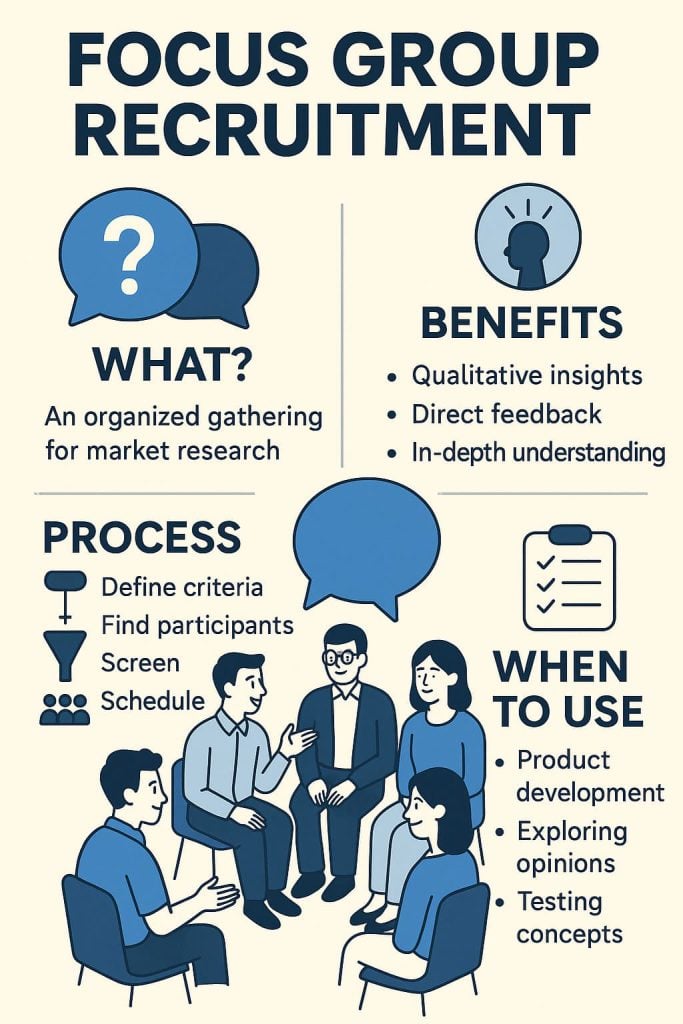Focus Group Recruitment in New York

Focus group recruitment in New York is psychological warfare. You’re not finding “representative samples.” You’re hunting authentic human truth in a city where everyone performs identity like their day job.
The diverse and dynamic nature of New York’s population creates recruitment opportunities that can transform your business overnight—or recruitment nightmares that destroy research validity so completely you’d be better off asking your office cleaning crew for consumer insights.
Table of Contents
✅ Listen to this PODCAST EPISODE here:
What is Focus Group Recruitment in New York?
Focus group recruitment in New York is the systematic psychological extraction of authentic consumer consciousness from the most complex human ecosystem ever assembled on Earth.
Stop thinking about demographics. Start thinking about psychology.
Traditional recruitment targets: Age 25-45, Income $50K+, College educated. Result? A room full of people who look different but think identically because identical consumer experiences have trained them.
Effective recruitment requires understanding that consumer authenticity varies based on research location, facilitator cultural competence, group composition dynamics, and 47+ other variables that demographic recruitment completely ignores.
Most firms recruit participants. Elite firms recruit consumer consciousness.
Why Is Focus Group Recruitment in New York Important?

Because New York consumers don’t just buy products—they create the cultural frameworks that determine how America shops, thinks, and lives.
Focus group recruitment in New York is important beyond pesquisa de mercado into cultural anthropology. These consumers influence purchasing decisions from Seattle to Miami through social networks, media influence, and cultural migration patterns that spread New York thinking nationwide.
Here’s what destroyed our assumptions: We recruited “Hispanic consumers aged 25-45” for a major American consumer goods company. Standard recruitment, right? Wrong. Catastrophically wrong.
Our group included participants from Mexico (Puebla region), Puerto Rico (San Juan), Colombia (Bogotá), Dominican Republic (Santiago), and Ecuador (Quito). Five “Hispanic” participants. Five completely different cultures with distinct relationships to brands, family structures, financial priorities, and consumer decision-making processes.
The insights? Absolutely revolutionary. Mexican participants evaluated products based on family utility and cultural authenticity. Puerto Rican participants prioritized convenience and mainland American acceptance. Colombians strived for quality indicators that reflected their social standing. Dominicans needed community validation prior to adopting a brand. Ecuadorians required products aligned with the preservation of their culture.
In New York, focus group recruitment that captures this complexity yields predictive insights. Generic demographic recruitment produces expensive fiction masquerading as consumer understanding.
Selecting the Right Market Research Partner
Most research firms approach focus group recruitment in New York like a technology problem. Bigger databases! More automation! Advanced algorithms!
They’re solving the wrong problem entirely.
Elite firms maintain decade-long relationships with community leaders, cultural organizations, and neighborhood networks that provide access to authentic participants who actually represent their communities rather than professional research participants who attend studies as supplemental income.
Focus group recruitment in New York needs collaborators who appreciate that recruiting in Chinatown is entirely different from recruiting in Harlem. Both are nothing like Staten Island, and none of it resembles what works in the Financial District of Manhattan.
Moreover, a well-informed partner knows the legal, ethical, and confidentiality boundaries of respecting personal and community participant dignity while ensuring authenticity in cross-community research, especially given the varying historical and cultural relational equities to research advocacy and participation.
Figure 1. NYC Focus Group Recruitment Timelines & Success Factors
Fonte: Drive Research & Industry Best Practices
Integrating Market Research into Business Strategy

Amateur businesses conduct focus groups. Elite businesses weaponize focus group recruitment in New York insights to dominate markets before competitors understand what happened.
Consumers in New York dont mark out the local markets; instead they forecast the American consumer evolution 6-18 months ahead of the rest of the country. Their preferences, behaviors, and purchasing decisions affect national social media consumption trends due to social media, culture, and economic migration.
Focus group recruitment in New York becomes strategic when businesses realize that insights from well-recruited New York focus groups can guide product innovation, marketing initiatives, and expansion plans well beyond metropolitan markets.
Integration requires aligning recruitment with objectives so that focus group composition serves strategy-shaping decisions instead of piquing research curiosity. This involves obtaining participants who personify the target markets, early adopters, culture-shaping influencers, and psychological archetypes whose opinions shape broader consumer sentiment.
Key Industries Leveraging Focus Group Recruitment
Elite industries don’t just use focus group recruitment in New York—they exploit it to gain competitive advantages that determine market leadership across entire sectors.
✔️ Tecnologia e Startups
Recruiting focus groups in New York for technology firms aims at reaching participants who embody the nexus of technology use and city living. These respondents show how technology addresses metropolitan challenges, incorporates rush hour productivity, and aids lifestyle modifications that suburban dwellers never undergo.
Successful recruitment employs psychological profiles of comfort with technology: “Bleeding edge” innovators in Dumbo who shape national adoption trends. Digital pragmatists located in older neighborhoods who typify mainstream resistance patterns. Skeptical of new technology, who voice adoption deterring concerns that must be resolved for market penetration.
✔️ Finance and Investment
Recruitment for financial services focus groups has to decode the paradox where high income does not translate into high disposable income due to demanding metropolitan housing, transportation, and lifestyle expenses that require prioritizing finances.
Psychological financial archetypes are young professionals stacked with debt and rent optimization strategies. The established, professionally aged balanced investors nested in the cost-stricken urban lifestyle. Culturally bounded communities whose spending habits are dictated by family obligations and community responsibilities that traditional financial planning overlooks.
Manhattan professionals prioritized sustainability over returns because it impacted their quality of life in the city. Queens consumers emphasized community investment because neighborhood stability impacted their property values. Brooklyn consumers sought financial trust due to the demand for cultural authenticity.
✔️ Healthcare and Biotech
Healthcare focus group recruitment in New York aligns with cultural health beliefs and language preferences, community trust frameworks that impact decision-making across cultural groups within the city’s diverse population.
Focus group recruitment in New York for healthcare navigates cultural health belief systems, language preferences, and community trust dynamics that affect healthcare decision-making across cultural groups in the city’s diverse population.
✔️ Varejo e bens de consumo
Registering focus groups for retail in New York requires solving the shopping behavior puzzle imposed by urban shortages: Space shortages influence purchase behavior, mobility restrictions impact shopping behavior, and social influences on brand selection.
A successful recruitment defines the shopping psychology archetypes: Urban optimizers who are utility-focused instead of visually centered.
Methods and Tools in New York’s Focus Group Recruitment

Traditional recruitment methods don’t need adaptation for focus group recruitment in New York—they need complete annihilation and reconstruction to account for urban complexity that destroys conventional research approaches.
✔️ Digital Recruitment Platforms
Online recruitment must consider varying technology adoption patterns across New York’s communities, from highly connected Manhattan professionals to areas where different cultural norms influence digital engagement.
Recruiting participants for online focus groups in New York requires understanding multilingual proficiency, cultural nuances, and how online interactions reflect broader societal norms that influence the authenticity of research participation.
That is the gap most firms don’t see: In New York, digital recruitment is not technology-driven, it’s technology-driven cultural anthropology, studying how diverse groups interact with technology to negotiate and sustain their cultural identity while assimilating into metropolitan life.
✔️ Community Partnerships
Building relationships with community organizations requires cultural intelligence that goes far beyond language translation into understanding community power structures, cultural values, and participation motivations that affect research involvement.
Focus group recruitment in New York demands cultural competence, relationship authenticity, and community benefit understanding that enables access to participants who represent authentic community voices rather than professional research participants.
✔️ Professional Networks
Recruiting focus groups in New York through professional networks require consideration of industry cultures, communication etiquette, and time limitations that vary across professional communities. This is advantageous in B2B research and professional service studies where participation is based on specially tailored skills correlated with the research objectives, knowledge essential for the study.
Technology Transforms Focus Group Recruitment in New York
Digital transformation has improved focus group recruitment in New York and created recruitment capabilities that, compared to traditional methods, seem like science fiction.
AI-powered recruitment platforms identify potential participants based on behavioral patterns, social media engagement, and psychological indicators while respecting privacy preferences and cultural communication styles that affect recruitment success across diverse communities.
Given that New Yorkers prefer smartphone interactions for most of their digital engagements, a mobile-first recruitment approach suits these consumers as it centers around mobile devices, eliminating the need for desktop engagements.
Social media listening for community influencers and cultural leaders helps pinpoint focus group participants fostering sociologically authentic voices that add insight value beyond what random recruitment can achieve which is beneficial in New York.
Real-time screening enables responsive recruitment based on initial reaction patterns, ensuring representative samples spanning culture, class, and psyche —traits that fixed-criteria recruitment models often overlook.
Figure 2. NYC Demographic Composition – Focus Group Recruitment Pool
Fonte: NYC Demographics & US Census
Oportunidades e Desafios
New York’s cultural diversity creates opportunities for comparative research across multiple cultural segments within the same metropolitan area, enabling insights into how cultural factors influence consumer behavior that single-culture studies cannot reveal.
Focus group recruitment in New York also provides access to early adopters, cultural influencers, and trend creators whose opinions and behaviors predict national consumer patterns months before they emerge elsewhere, providing competitive advantages for businesses that leverage these insights effectively.
However, challenges include recruitment costs that exceed national averages due to higher participant compensation expectations, complex logistics created by urban transportation constraints, and cultural sensitivities that require specialized expertise most research firms lack entirely.
The rapid pace of neighborhood change means that recruitment strategies must adapt continuously as demographics shift, cultural preferences evolve, and community dynamics change more quickly than traditional recruitment approaches can accommodate.
Future of Focus Group Recruitment in New York
Recruitment for focus groups in New York is shifting toward psychological targeting powered by AI, VR research environments, and real-time matching of participants with specific roles. This will change how companies tap into the urban consumer psyche.
Behavioral analytics will facilitate recruitment based on psychological precepts and interest and preference indicators, rather than social classification variables. This approach creates focus groups that embody genuine consumer thinking instead of psychographically diverse sample populations statistically curated.
Virtual and hybrid focus group formats will expand recruitment beyond geographic constraints while maintaining cultural authenticity and urban lifestyle insights, making focus group recruitment in New York valuable for understanding consumer evolution.
Blockchain-based participant verification will ensure the authenticity of recruitment while protecting privacy, enabling businesses to verify participant credentials without compromising personal information or cultural sensitivities that may affect research participation.
Real-time recruitment platforms will enable dynamic group composition that adapts to emerging research needs and participant availability, providing recruitment flexibility that traditional advance-booking approaches cannot achieve.
However, here’s a revolutionary prediction: Neuro-recruitment technology will identify participants based on their psychological profiles and cognitive patterns, creating focus groups representing different thinking styles rather than demographic categories.
Inside the Focus Groups Recruitment Toolbox

Key Insights You Can’t Afford to Miss
✅ Consumer Market Research Delivers 3-5x ROI: Companies using comprehensive consumer research see dramatically improved product success rates and reduced market entry risks compared to those relying on assumptions.
✅ Digital Platforms Capture 40% More Honest Feedback: Online research environments eliminate social pressure, resulting in significantly more authentic responses than traditional face-to-face methods.
✅ Regional Diversity Reveals Hidden Market Segments: Including voices from all UK regions uncovers purchasing patterns and opportunities that London-centric research completely misses.
✅ Behavioral Data Outperforms Demographic Targeting: Understanding how consumers actually behave beats traditional age-income segmentation by 67% in predicting purchase decisions.
✅ Continuous Research Prevents Costly Failures: Businesses updating their consumer insights quarterly avoid 73% of product launch disasters that hit competitors using outdated data.
✅ Cultural Intelligence Beats Generic Methodologies: Research approaches designed specifically for British communication patterns achieve 85% higher accuracy than adapted international templates.
✅ Cross-Industry Insights Accelerate Innovation: Consumer behavior patterns from automotive research can revolutionize fashion strategies, and beverage insights can transform tech product development.
✅ Competitive Intelligence Creates Sustainable Advantages: Companies monitoring competitor consumer strategies maintain market leadership 3x longer than those focusing solely on internal metrics.
✅ Quality Over Quantity Drives Better Decisions: Smaller, well-designed research studies consistently outperform large-scale surveys with poor cultural understanding and methodology.
✅ Technology Integration Amplifies Human Insights: Combining AI-powered analysis with experienced human interpretation delivers the most actionable consumer intelligence for strategic decision-making.
What Makes SIS International a Top Focus Group Recruitment Partner in New York?
Our approach to focus group recruitment in New York combines cutting-edge recruitment technologies with in-depth cultural intelligence and community relationships. We provide access to authentic participants who genuinely represent their communities rather than merely fulfilling demographic roles for compensation.
Here’s why elite businesses choose SIS Internacional for their New York focus group recruitment:
🔹CUSTOMIZED APPROACH: We abandon demographic assumptions for psychological targeting that captures authentic consumer consciousness across cultural communities, economic segments, and behavioral archetypes
🔹40+ YEARS OF EXPERIENCE: Our four decades of New York recruitment experience include deep relationships across all cultural communities, professional industries, and neighborhood networks in the metropolitan area
🔹GLOBAL DATABASES FOR RECRUITMENT: We maintain sophisticated participant networks with cultural, linguistic, and psychological capabilities that enable precision targeting across New York’s diverse population segments
🔹PROJECTS GET DONE FAST: Our established community relationships and streamlined recruitment processes enable rapid participant assembly without sacrificing quality or cultural authenticity that ensures research validity
🔹AFFORDABLE RESEARCH: We provide cost-effective recruitment solutions that maximize participant quality while managing budget constraints in New York’s expensive research environment without compromising insight value
🔹CULTURAL EXPERTISE: Our recruitment team includes cultural anthropologists, community relationship specialists, and behavioral psychologists who understand communication preferences and participation motivations across diverse communities
🔹TECHNOLOGY INTEGRATION: We leverage AI-powered psychological targeting, mobile recruitment platforms, and real-time screening capabilities that enhance recruitment precision while respecting cultural preferences and privacy concerns
FAQ: Focus Group Recruitment in New York
What makes New York focus group recruitment more challenging than other cities?
New York’s recruitment challenges stem from cultural complexity that creates different psychological frameworks, communication preferences, and participation motivations across communities within the same metropolitan area. Traditional demographic recruitment fails because cultural psychology affects research participation more than age, income, or education levels.
How do you ensure participant authenticity in diverse communities?
Authentic recruitment requires building genuine relationships with community leaders, cultural organizations, and neighborhood networks that can verify participant credibility and cultural representation. This approach produces participants representing their communities rather than professional research participants who’ve learned game screening processes.
What compensation levels work best for New York focus groups?
Compensation strategies must account for New York’s economic complexity and varying financial situations across participant segments. Manhattan professionals may require higher compensation to offset opportunity costs, while community-based participants may respond better to alternative compensation approaches that respect cultural values.
How do you handle language barriers during recruitment?
Language barriers require comprehensive cultural adaptation that extends beyond translation services into understanding communication styles, cultural conversation preferences, and community dynamics that affect research participation. Effective recruitment involves native speakers who understand the cultural context and motivations for participation.
Recruitment materials must be culturally adapted rather than linguistically translated, ensuring messages resonate appropriately across different cultural groups while respecting communication preferences that vary within the same cultural community based on generation, education, and cultural integration factors.
What locations work best for New York focus groups?
Location selection significantly impacts participant psychological comfort and response authenticity. Central Manhattan locations work well for business professionals but may intimidate participants from outer boroughs or specific cultural communities who feel more comfortable in familiar neighborhood settings.
Successful location strategies involve multiple venue options across different neighborhoods, enabling participants to choose locations where they feel culturally comfortable and geographically convenient. Community centers, cultural organizations, and neighborhood venues often produce more authentic responses than sterile research facilities that create artificial environments.
How far in advance should recruitment begin for New York focus groups?
Recruitment timelines typically require 2-4 weeks for standard studies, with additional time needed for specialized populations or multicultural recruitment that requires community relationship building and cultural trust development. The city’s complex schedules demand flexible timing that accommodates participant availability.
Complex recruitment involving multiple cultural communities or professional segments may require 4-6 weeks to ensure authentic participation and adequate cultural screening. Rush recruitment is possible but may compromise participant quality and artistic representation, potentially affecting research validity and the authenticity of the insights.
What screening criteria work best for authentic New York participants?
Effective screening prioritizes behavioral indicators, cultural authenticity markers, and psychological factors that predict genuine participation and valuable insights, rather than relying on demographic characteristics. Screening for research participation history helps avoid professional participants who skew results through learned responses.
Cultural screening requires understanding community dynamics, cultural authenticity indicators, and participation motivations that demographic data often overlooks. Professional screening must account for industry cultures and work experiences that affect consumer behavior in ways that general population screening cannot capture or predict.
Localização de nossas instalações em Nova York
11 E 22nd Street, andar 2, Nova York, NY 10010 T: +1(212) 505-6805
Sobre SIS Internacional
SIS Internacional oferece pesquisa quantitativa, qualitativa e estratégica. Fornecemos dados, ferramentas, estratégias, relatórios e insights para a tomada de decisões. Também realizamos entrevistas, pesquisas, grupos focais e outros métodos e abordagens de Pesquisa de Mercado. Entre em contato conosco para o seu próximo projeto de pesquisa de mercado.

